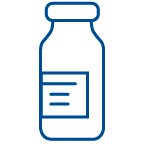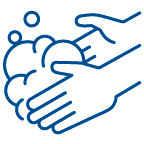COVID-19: Prevention and Groups at Higher Risk
The best way to protect yourself and those around you from COVID-19 is to get vaccinated.
Learn more about the benefits of vaccination.
Prevention Tips

Get Vaccinated
- COVID-19 vaccines are available for people ages 6 months and older.
- Visit the NYC COVID-19 and Flu Vaccine Finder or call 212-COVID19 (212-268-4319) to find a vaccination site.
- COVID-19: Vaccine
![]()
Wear a Mask
- Wear a mask when recommended, based on current spread of COVID-19.
- Consider wearing a mask if you are at high risk for severe COVID-19 or are around others who are.
- Always wear a mask if you are sick and unable to separate from others, and for 5 days after you leave hmoe once you start feeling better.
- Always wear a mask for 10 days after being exposed to someone who has COVID-19.
- Wear a high-quality mask, such as a KN95, KF94 or N95 for the best protection from COVID-19.
![]()
Get Tested
- Get tested if you have symptoms or were recently exposed.
- If you test positive, you may be eligible for treatment. Treatment works best the sooner you begin, so it is important to get tested and seek care right away.
- COVID-19: Express Testing: Schedule an appointment at one of the Health Department's free Express testing locations, which usually return test results within a few hours. Testing is available regardless of immigration status.
- Visit NYC Health + Hospitals or call 212-COVID19 to find locations to get free at home tests. You can also visit Health + Hospitals facility for testing, regardless of immigration status or ability to pay.
- Visit COVID-19 Testing for more information about COVID-19 tests.
![]()
Stay Home If Sick
- Follow all isolation guidance, including wearing a mask. COVID-19 is verycontagious. You can spread COVID-19 even if you do not have symptoms.
- COVID-19: When You Are Sick

Wash Your Hands
- Wash your hands frequently with soap and water for at least 20 seconds, or use a hand sanitizer.
People at Increased Risk of Severe Illness
People at increased risk of severe illness — who are more likely to require hospitalization if they get COVID-19 — need to be especially careful. If you are at increased risk for severe illness, treatment is available.
Among adults, the risk for severe illness from COVID-19 increases with age, with older adults at highest risk. For example, people in their 50s are at higher risk for severe illness than people in their 40s. Similarly, people in their 60s or 70s are, in general, at higher risk for severe illness than people in their 50s.
People of any age with the underlying health conditions identified by the CDC are more likely to get severely ill from COVID-19:
Racial/Ethnic Groups
Long-standing systemic health and social inequities — such as in education, employment, housing and health care access — have put people from some racial and ethnic groups (including Black, Latino and Indigenous people) at increased risk of getting sick and dying from COVID-19.
Studies have shown that people from some racial and ethnic groups are dying from COVID-19 at younger ages. People of color are often younger when they develop chronic medical conditions and may be more likely to have more than one condition.




